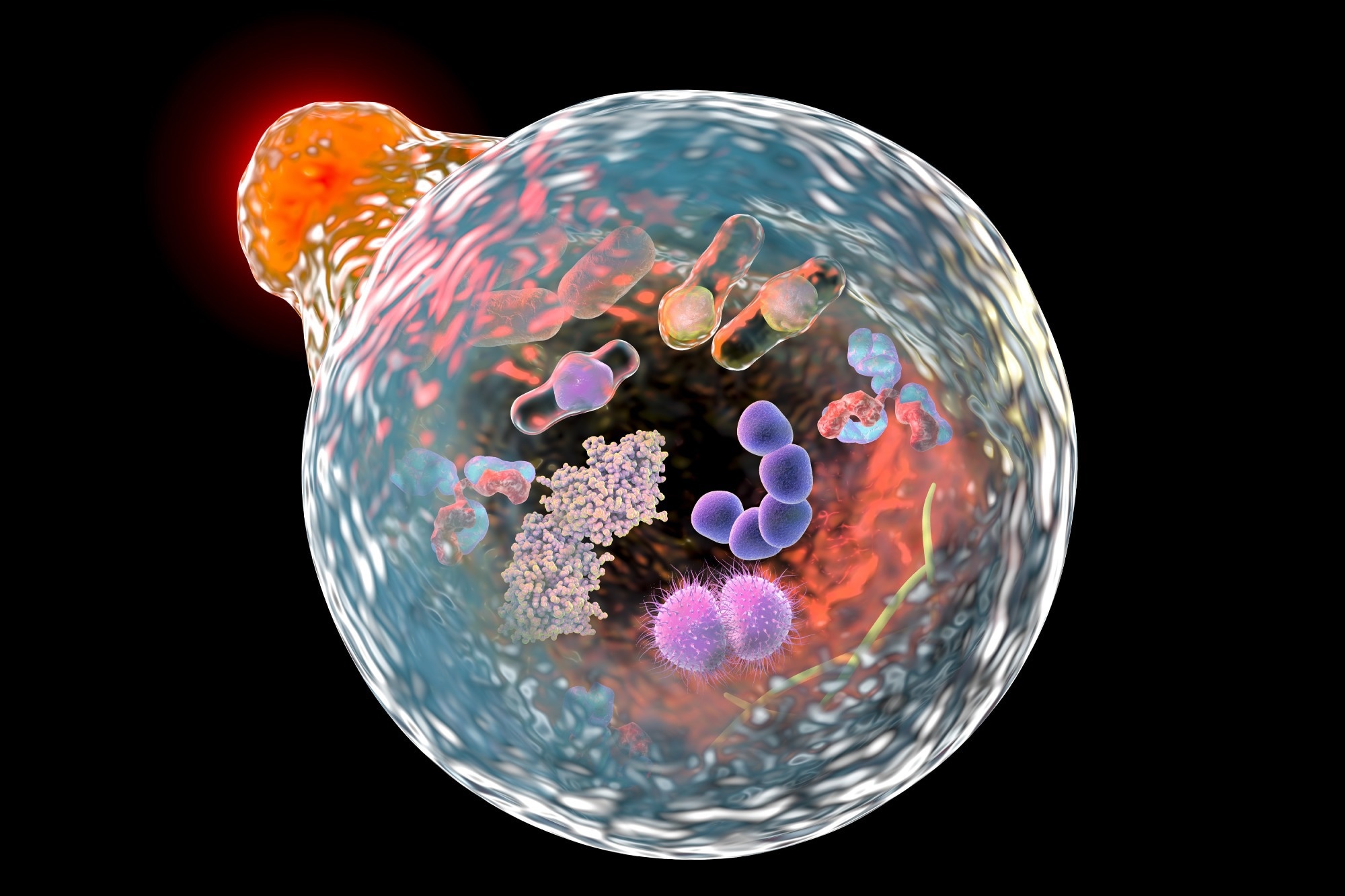 By Pooja Toshniwal PahariaReviewed by Lexie CornerMay 20 2025
By Pooja Toshniwal PahariaReviewed by Lexie CornerMay 20 2025A recent review in FEBS Letters explores the role of autophagy in cancer and protein conformational disorders.
Autophagy helps maintain cellular homeostasis. In cancer, it can suppress tumor growth in early stages but promote tumor survival in advanced stages. In protein diseases, autophagy clears toxic protein aggregates from cells and tissues.
Because of this dual role, regulating autophagy is being studied as a potential treatment strategy for both cancer and protein misfolding diseases.

Image Credit: Kateryna Kon/Shutterstock.com
Summary of the Review
Autophagy is a catabolic process that removes damaged organelles and misfolded proteins to support cell health. It plays a role in cell metabolism, immunological surveillance, and pathogen clearance. When autophagy fails, it can contribute to disease.
This review examines how autophagy maintains cellular homeostasis in cancer and protein-related disorders.
Autophagy and Cancer
Autophagy has both tumor-suppressing and tumor-supporting roles, depending on the tumor’s stage and environment.
In early stages, autophagy exerts anti-tumoral effects by clearing toxic misfolded proteins and non-functional cell organelles to maintain genomic stability.
BECLIN 1 is a tumor suppressor gene, and mouse studies have shown that its loss increases tumor initiation and progression. In estrogen receptor-negative breast cancers, lower levels of BECLIN 1 are linked to a poorer prognosis.
Another key tumor suppressor gene, p53, inhibits autophagy pathways in the cytoplasm but promotes autophagy when it moves to the nucleus during cellular stress. Loss of p53 is associated with more aggressive tumor behavior.
In advanced tumors, autophagy promotes cancer cell survival. It helps cells manage metabolic demands and environmental stressors, such as hypoxia, and contributes to chemotherapy resistance. Autophagy also enables immune evasion by degrading major histocompatibility complex-I (MHC-I) molecules and granzyme B released by natural killer cells, preventing T cell recognition.
Additionally, autophagy affects the tumor microenvironment by regulating the production and secretion of cytokines and chemokines, signaling proteins that induce directional movement of immune cells.
Accumulation of the autophagy receptor p62 in cells promotes tumor progression by sustaining NF-kB signaling, activating nuclear factor erythroid 2-related factor 2 (NRF2), and inhibiting Kelch-like ECH-associated protein 1 (KEAP1), a negative regulator of NRF2.
Inhibiting autophagy can enhance the efficacy of chemotherapy and targeted therapies in tumors, especially in cancers with RAS mutations. Currently, chloroquine and hydroxychloroquine are the only FDA-approved drugs that inhibit autophagy, but they act at later stages of the process, require high doses, and have shown mixed results in trials.
Ongoing Phase I/II trials are testing combinations of hydroxychloroquine with kinase inhibitors (like sorafenib) and monoclonal antibodies (like ipilimumab) in liver cancer, brain gliomas, and metastatic pancreatic cancer to improve the effectiveness of autophagy inhibition.
Download your PDF copy now!
Autophagy and Protein Disorders
The accumulation of misfolded proteins in cells leads to protein conformational disorders, such as Alzheimer's disease (AD), Parkinson's disease (PD), Huntington's disease, and amyotrophic lateral sclerosis (ALS).
Autophagy eliminates these toxic protein aggregates from cells, restoring physiology. Enhancing autophagy through strategies like mammalian target of rapamycin (mTOR) inhibition or AMP-activated protein kinase (AMPK) activation promotes the clearance of misfolded proteins.
Autophagy exerts cytoprotective functions by removing damaged organelles, such as the endoplasmic reticulum (ER) and mitochondria. This role is especially important in neurodegenerative diseases, where the failure to remove damaged components can impair nerve function and cognition. Enhancing autophagy using small-molecule modulators or gene therapy has shown potential in promoting the clearance of toxic misfolded proteins.
Genetic mutations in autophagy-related genes influence the onset and progression of protein disorders. For example, mutations in PRESENILIN 1 result in familial AD. In Alpha-1 antitrypsin (AAT) deficiency (AATD), a mutant (misfolded) variant of the AAT protein, known as the Z variant of AAT (ATZ), accumulates in hepatocytes, contributing to liver damage. By degrading ATZ, autophagy can maintain cellular health.
Small-molecule autophagy modulators target different stages of the pathway, including the initiation, nucleation, and degradation of autophagosomes in lysosomes.
Gene therapy approaches aim to enhance autophagy by increasing the expression of proteins like parkin, RBR E3 ubiquitin protein ligase (PRKN), and BECLIN 1, which support the removal of misfolded amyloid in AD and alpha-synuclein in PD.
Clinical trials are investigating vasodilators such as hydralazine and mTOR inhibitors like rapamycin to manage AD, while compounds like trehalose and the antidiabetic drug metformin are being studied for PD.
Final Notes
Autophagy plays a complex role in disease. In cancer, it may suppress tumors early but support their survival later. In protein disorders, it helps remove toxic aggregates and maintain cell health.
Targeting autophagy for therapy requires careful balancing of benefits and risks. While research is ongoing, this process remains a key area of interest for developing treatments for both cancer and protein misfolding diseases.
Interested in the cause of protein misfolding? See this related article: Deciphering the Mechanisms of Protein Aggregation in Neurodegenerative Diseases
Journal Reference
Attanasio, S. (2025). Autophagy in cancer and protein conformational disorders. FEBS Letters. DOI:10.1002/1873-3468.70061, https://febs.onlinelibrary.wiley.com/doi/full/10.1002/1873-3468.70061